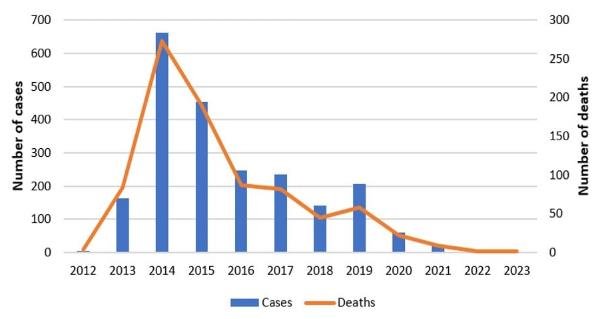Middle East respiratory syndrome (MERS) is a viral respiratory infection caused by the Middle East respiratory syndrome coronavirus (MERS-CoV). The virus can cause severe pneumonia, acute respiratory distress syndrome, septic shock, and multi-organ failure, leading to death in some cases. The case-fatality ratio of MERS is estimated to be around 36%, but this may be an overestimate as mild or asymptomatic cases may not be detected by the current surveillance systems.
MERS-CoV is believed to originate from dromedary camels, which are the natural host and reservoir of the virus. Humans can get infected with MERS-CoV through direct or indirect contact with camels or camel products, such as milk, meat, or urine. Human-to-human transmission of MERS-CoV can also occur through close contact with infected patients, especially in healthcare settings. However, the virus does not seem to spread easily among humans and sustained community transmission has not been observed.

How many cases have been reported in Saudi Arabia and elsewhere?
According to the World Health Organization (WHO), Saudi Arabia has reported three confirmed cases of MERS-CoV infection, including two deaths, from 13 September 2022 to 12 August 2023. The cases were reported from three different regions: Riyadh, Asser, and Makkah Al Mukarramah. All three cases were male, aged 42, 83, and 85 years respectively. They all had underlying health conditions and a history of contact with camels or consumption of raw camel milk before they developed symptoms. None of them were healthcare workers.
The Ministry of Health of Saudi Arabia followed up the close contacts of the three cases and found no secondary infections. The Ministry of Agriculture also investigated the camels that were in contact with the cases and isolated those that tested positive for MERS-CoV until they cleared the virus.
Since the first report of MERS-CoV in humans in 2012, a total of 2,605 laboratory-confirmed cases have been reported globally, with 937 associated deaths. The majority of these cases (84%) have been reported from Saudi Arabia, which has also recorded the highest number of deaths (91%). Other countries that have reported MERS-CoV cases include Jordan, Qatar, Egypt, the United Arab Emirates, Kuwait, Turkey, Oman, Algeria, Bangladesh, Indonesia, Austria, the United Kingdom, South Korea, the United States, China, Thailand, and the Philippines. Most of these cases were linked to travel or exposure to camels in the Middle East.
How has COVID-19 affected MERS-CoV surveillance and prevention?
The WHO noted that the number of MERS-CoV cases reported to it has declined significantly since the beginning of the COVID-19 pandemic, likely due to competing surveillance priorities and similar clinical presentations of both diseases. The WHO also suggested that COVID-19 prevention measures such as social distancing and mask wearing may have reduced the risk of human-to-human transmission of MERS-CoV.
However, the WHO stressed that MERS-CoV remains a threat in countries where camels are present and where human exposure to them is common. The WHO urged these countries to maintain their surveillance and response capacities for MERS-CoV and to implement effective infection prevention and control measures in healthcare facilities. The WHO also advised travelers to avoid contact with camels or camel products and to practice good hygiene when visiting areas where MERS-CoV is circulating.
